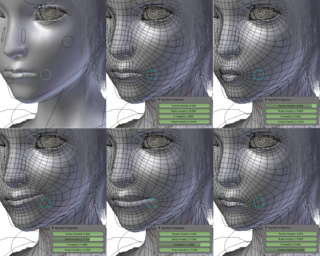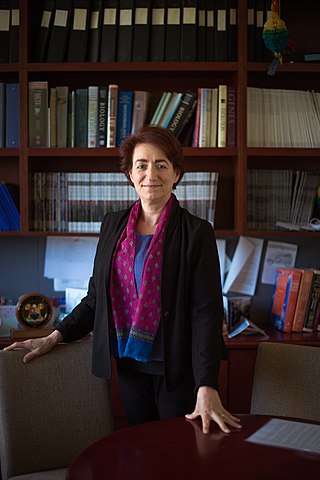Related Research Articles

A sound card is an internal expansion card that provides input and output of audio signals to and from a computer under the control of computer programs. The term sound card is also applied to external audio interfaces used for professional audio applications.

The human voice consists of sound made by a human being using the vocal tract, including talking, singing, laughing, crying, screaming, shouting, humming or yelling. The human voice frequency is specifically a part of human sound production in which the vocal folds are the primary sound source.
Speech synthesis is the artificial production of human speech. A computer system used for this purpose is called a speech synthesizer, and can be implemented in software or hardware products. A text-to-speech (TTS) system converts normal language text into speech; other systems render symbolic linguistic representations like phonetic transcriptions into speech. The reverse process is speech recognition.

Northeastern University is a private research university with its main campus in Boston, Massachusetts. Established in 1898, it was founded by the Boston Young Men's Christian Association as an all-male institute before being incorporated as Northeastern College in 1916, gaining university status in 1922. With more than 38,000 students, Northeastern is the largest university in Massachusetts by enrollment.

Human image synthesis is technology that can be applied to make believable and even photorealistic renditions of human-likenesses, moving or still. It has effectively existed since the early 2000s. Many films using computer generated imagery have featured synthetic images of human-like characters digitally composited onto the real or other simulated film material. Towards the end of the 2010s deep learning artificial intelligence has been applied to synthesize images and video that look like humans, without need for human assistance, once the training phase has been completed, whereas the old school 7D-route required massive amounts of human work .
Northeastern University School of Pharmacy and Pharmaceutical Sciences is the pharmacy school at Northeastern University in Boston, Massachusetts. It is one of four schools that comprise the Bouvé College of Health Sciences. Northeastern's Doctor of Pharmacy (PharmD) program is the only PharmD cooperative education, or co-op, program in the United States. Students who participate in the co-op program are placed in paid, full-time positions that provide profession experience.
A virtual human, virtual persona, or digital clone is the creation or re-creation of a human being in image and voice using computer-generated imagery and sound, that is often indistinguishable from the real actor.

Carla Scaletti is an American harpist, composer, music technologist and the inventor of the Kyma Sound Design Environment as well as president of Symbolic Sound.
Teresa Thomas "Terry" Fulmer, is the current president of The John A. Hartford Foundation. Earlier positions include distinguished professor and dean of the Bouvé College of Health Sciences at Northeastern University and dean of the College of Nursing at New York University. She is known for her extensive research in geriatrics and elder abuse. She has received funding from the National Institute on Aging, the National Institute of Nursing Research and other foundations for her research regarding elder abuse.

The Bouvé College of Health Sciences is the allied health education college of Northeastern University in Boston, Massachusetts. It encompasses four schools: School of Community Health and Behavioral Sciences, School of Nursing, School of Clinical and Rehabilitation Sciences, and School of Pharmacy and Pharmaceutical Sciences. The college offers more than 80 undergraduate and graduate programs, including its online-based accelerated nursing program. In addition to Boston, Bouvé College of Health Science programs are offered at satellite locations in Burlington, Massachusetts and Charlotte, North Carolina and online.
Hortensia Amaro is a Cuban-American educator, and formerly Distinguished Professor at Northeastern University and Associate Vice Provost of Community Research and Dean's Professor of Social Work and Preventative Medicine at the University of Southern California. Amaro was born in Cuba and moved to Los Angeles, California as a child. From a young age, she recognized that there was a demand for public health services in her area, particularly by immigrants and minorities. Amaro assisted in the development and implementation of numerous treatment and prevention models as well as the creation and establishment of several clinical interventions and programs dedicated to substance abuse, mental health and HIV/AIDS treatment and prevention that target women and minorities.

Hazel L. Sive is a South African-born biologist and educator. She is Dean of the College of Science, and Professor of Biology at Northeastern University. Sive is a research pioneer, award-winning educator and innovator in the higher education space who was elected as a Fellow of the American Association for the Advancement of Science in November 2021. Prior to June 2020, she was a Member of Whitehead Institute for Biomedical Research, Professor of Biology at Massachusetts Institute of Technology and Associate Member of the Broad Institute of MIT and Harvard. Sive studies development of the vertebrate embryo, and has made unique contributions to understanding how the face forms and how the brain develops its structure. Her lab also seeks to understand the origins of neurological and neurodevelopmental disorders, such as epilepsy, autism, Pitt–Hopkins syndrome and 16p11.2 deletion syndrome.
Deepfakes were originally defined as synthetic media that have been digitally manipulated to replace one person's likeness convincingly with that of another. The term was coined in 2017 by a Reddit user, and has later been expanded to cover any videos, pictures, or audio made with artificial intelligence to appear real, for example realistic-looking images of people who do not exist. While the act of creating fake content is not new, deepfakes leverage tools and techniques from machine learning and artificial intelligence, including facial recognition algorithms and artificial neural networks such as variational autoencoders (VAEs) and generative adversarial networks (GANs). In turn the field of image forensics develops techniques to detect manipulated images. Deepfakes have garnered widespread attention for their potential use in creating child sexual abuse material, celebrity pornographic videos, revenge porn, fake news, hoaxes, bullying, and financial fraud. The spreading of disinformation and hate speech through deepfakes has a potential to undermine core functions and norms of democratic systems by interfering with people's ability to participate in decisions that affect them, determine collective agendas and express political will through informed decision-making. Both the information technology industry and government have responded with recommendations to detect and limit their use.
Emily Mower Provost is a professor of computer science at the University of Michigan. She directs the Computational Human-Centered Artificial Intelligence (CHAI) Laboratory.
Synthetic media is a catch-all term for the artificial production, manipulation, and modification of data and media by automated means, especially through the use of artificial intelligence algorithms, such as for the purpose of misleading people or changing an original meaning. Synthetic media as a field has grown rapidly since the creation of generative adversarial networks, primarily through the rise of deepfakes as well as music synthesis, text generation, human image synthesis, speech synthesis, and more. Though experts use the term "synthetic media," individual methods such as deepfakes and text synthesis are sometimes not referred to as such by the media but instead by their respective terminology Significant attention arose towards the field of synthetic media starting in 2017 when Motherboard reported on the emergence of AI altered pornographic videos to insert the faces of famous actresses. Potential hazards of synthetic media include the spread of misinformation, further loss of trust in institutions such as media and government, the mass automation of creative and journalistic jobs and a retreat into AI-generated fantasy worlds. Synthetic media is an applied form of artificial imagination.
Ann Kristen Syrdal was an American psychologist and computer science researcher who worked with speech synthesis technology. She developed the first female-sounding voice synthesizer.
An audio deepfake is a product of artificial intelligence used to create convincing speech sentences that sound like specific people saying things they did not say. This technology was initially developed for various applications to improve human life. For example, it can be used to produce audiobooks, and also to help people who have lost their voices to get them back. Commercially, it has opened the door to several opportunities. This technology can also create more personalized digital assistants and natural-sounding text-to-speech as well as speech translation services.
Andrea M. Matwyshyn is an American law professor and engineering professor at The Pennsylvania State University. She is known as a scholar of technology policy, particularly as an expert at the intersection of law and computer security and for her work with government. She is credited with originating the legal and policy concept of the Internet of Bodies.
Andrea Grimes Parker is an American computer scientist, researcher, and Associate Professor, known for her interdisciplinary study of human computer interaction (HCI) and personal health informatics. Parker is currently an associate professor at Georgia Institute of Technology School of Interactive Computing. She also currently serves as an Adjunct Associate Professor in the Rollins School of Public Health at Emory University.

Nikisha B. Jariwala is an Indian professor and computer science researcher known for her work in devising a computer model for converting Indian text into Braille. She is a Professor of Computer Science at Smt. Tanuben & Dr. Manubhai Trivedi College of Information Science.
References
- 1 2 "Rupal Patel CV" (PDF). Bouve Northeastern University website. Retrieved 27 July 2021.
- ↑ "Rupal Patel, PhD, CCC-SLP". Northeastern University Bouvé College of Health Sciences. Retrieved 27 July 2021.
- ↑ Spiegel, Alix. "New Voices For The Voiceless: Synthetic Speech Gets An Upgrade". NPR - National Public Radio. Retrieved 27 July 2021.
- ↑ "About us". VOCALiD. Retrieved 27 July 2021.
- ↑ Palmai, Kitti. "Voice cloning of growing interest to actors and cybercriminals". BBC News. Retrieved 27 July 2021.
- ↑ "Rupal Patel: Synthetic voices, as unique as fingerprints". YouTube. Retrieved 27 July 2021.